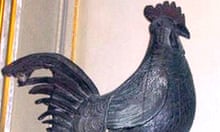Student campaigners have condemned an Oxford college for deciding to keep its statue of Cecil Rhodes, claiming the college has been influenced by a “dictatorship” of donors.
Activists in the Rhodes Must Fall campaign said Oriel College had “sold out”. They said “It is clear that Oriel has been influenced significantly by the threats of donors keen to maintain symbols of Cecil Rhodes.”
Ella Jeffreys, a master’s student, told the Guardian: “We feel that the decision of Oriel College, due to the threat of withdrawing funding by alumni, shows that money talks over students.
“Without any proper understanding they are whitewashing a serious and real history that still affects people today.”
The campaign said in a statement: “Oriel has been rushed into this decision by the irresponsible threats of wealthy individuals. This is a decision for the short term. It is a decision made by authorities, not by students. It is a decision motivated by power not by principle.”
The statement said the decision lacked “legitimacy” and warned: “It is a decision that jeopardises trust between students and the institution.”
Oriel College said last week that it would not remove the statue of Rhodes despite a campaign by students that has gained much media attention. The campaigners believe the British imperialist’s legacy should not be celebrated.
Last week Oriel said: “Following careful consideration, the college’s governing body has decided that the statue should remain in place and that the college will seek to provide a clear historical context to explain why it is there.”
It confirmed it had been warned of the possibility that it would lose about £100m in gifts should the statue be taken down. However, a spokesman insisted the financial implications were not the primary consideration.
Student activists said they would not be derailed by interventions such as those of Chris Patten, the chancellor of the university, who said in a recent interview that those involved with Rhodes Must Fall should “think about being educated elsewhere”.
They said at a packed press conference: “His intervention shows that it is the chancellor that is most concerned about avoiding uncomfortable debates and challenging discussions.
“Our campaign has never been about safe spaces. But the chancellor is clearly keen to carve out a safe space of his own, where debates about colonialism can be silenced and swept under the carpet.”
At the Rhodes Must Fall campaign press conference at Oxford pic.twitter.com/3VQbFqsDpf
— Aisha S Gani (@aishagani) February 1, 2016
Campaigners released seven demands on Monday and said the debate was not just about the statue of Rhodes but also about the representation of students and academics and curriculum change, as well as iconography.
Students called for a reckoning from the institution, and said their first demand was for Oxford to “acknowledge and confront its role in the ongoing physical and ideological violence of empire”. They want the university to apologise for its role and to offer more scholarships to black students from southern Africa.

Campaigners also called for a commitment to recontextualising iconography and said: “Murderous colonists and slaveholders belong in books and museums, not on the side of buildings.”
They said they wanted to hear “the voices suffocated into silence by a Eurocentric academy”. They demanded a decolonised curriculum, as well as blind-marked applications and implicit bias training for all academic staff.
The campaigners called for an immediate end to “outright racism” at campus and also demanded the university “take responsibility for the culture it perpetuates” and to ensure the work of anti-racist students and staff was properly recognised and institutionalised.
Simukai Chigudu, a postgraduate student in international development, said Oriel’s decision “throws into sharp relief that strong power donors have in shaping the college and underscores that it is not a free, open and democratic [process].
“The key is to undergo the democratic and egalitarian process of canvassing opinion and ideas, and that is where the campaign needs to go.
There is a profound attachment and misunderstanding on the legacy of imperialism.
He added: “The university does not take the views seriously of students prepared to put themselves on the front line. Oriel and the chancellor [have shown] a dereliction of duty.”
Rhodes attended Oriel College in the 1870s before returning to South Africa. It was there that he founded the De Beers diamond empire. He became one of the world’s wealthiest men and rose to be premier of the then Cape Colony in 1890.He is now chiefly remembered for beginning the policy of enforced racial segregation in South Africa and for his belief in the superiority of the Anglo-Saxon race.









Comments (…)
Sign in or create your Guardian account to join the discussion